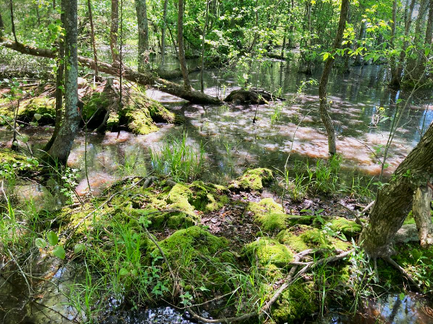|
By Jordan Thomas, ECWA Communications and Outreach Coordinator Earlier this year, the North Carolina General Assembly reduced wetland protections in North Carolina. The North Carolina Department of Environmental Quality (NC DEQ) estimates this decision, in combination with the results of the US Supreme Court Sackett v. EPA case, could result in nearly half of all wetlands in North Carolina being unprotected. We don’t know how many of Durham’s wetlands are left without legal protection, but the new rules leave wetlands that don’t have a surface water connection to a stream or river unprotected, and we know that there are a lot of those. Wetlands provide a wide range of environmental benefits. They primarily act as natural sponges, helping to control floods by absorbing and filtering excess stormwater during heavy rains. Wetlands also serve as vital habitats for wildlife due to their rich biodiversity. And, due to their ability to store carbon, they help reduce the effects of climate change by helping to offset greenhouse gas emissions. The importance of wetlands goes beyond their ecological benefits. Wetlands are also places of enjoyment, like the Beaver Marsh Nature Preserve! Recognizing and protecting these invaluable ecosystems is essential for our environmental future.  The good news is that we continue to work every day protecting these wetlands. This year, we were able to conserve an area called the Glennstone-Veasey Connector. As its name suggests, this protected forest land connects Glennstone Nature Preserve to Veasey Farm Nature Preserve. Because this beautiful forest wetland isn’t connected directly to a stream by a surface water channel, it is no longer legally a wetland. By protecting Durham’s wetlands, we are ensuring that a cleaner creek with rich biodiversity around it is possible for our future. The pathway to a greener future can be frustrating, but our individual small actions, from spreading awareness to actively participating in conservation initiatives, add up to a significant collective change. Despite the new legal classifications for wetlands, we’re still going to protect all of the nature in the watershed and we hope you join us! |
About UsECWA's vision is a living creek connecting human and natural communities in Durham. Through land acquisition, collaboration with the city, and public education, we hope to create a Durham where residents can bike or walk across the watershed and stop at local businesses and nature preserves along the way. Archives
February 2024
Categories
All
|
ECWA
Ellerbe Creek Watershed Association
Office: 904 Broad St Durham, NC 27705 | Mailing: PO Box 2679 Durham, NC 27715
919.698.9729 | [email protected]
919.698.9729 | [email protected]
Copyright ©ECWA
 RSS Feed
RSS Feed
